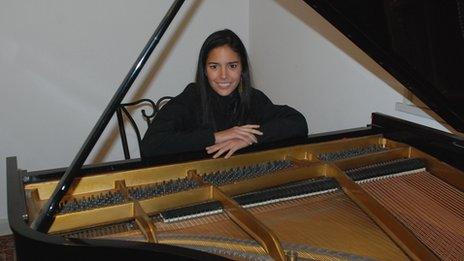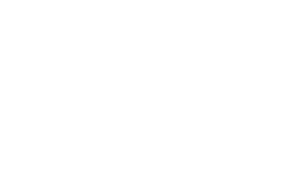Mahani Teave, Easter Island's only concert pianist
- Published

Mahani Teave learned to play classical music as a child growing up on windswept Easter Island - thousands of kilometres from mainland Chile
Think of the remote Chilean outpost of Easter Island and you are likely to think of the giant stone statues that are dotted around the island and whose origins are shrouded in mystery.
You are less likely, perhaps, to think of Bach, Haydn, Chopin and Rachmaninov.
But for one native Easter Islander, these long-dead European composers are a daily inspiration.
Mahani Teave started playing classical music as a young girl growing up on the South Pacific island, one of the most isolated places on earth.
But within a year her piano teacher had left. The only piano on the island fell into disrepair and Teave's career looked to be heading the same way.
But her mother had other plans. She moved the entire family more than 3,700km (2,300 miles) to the Chilean mainland so her daughter could continue to play.
Cultural limits
Teave completed university and went on to study music in the United States and Germany, where she is now based. Aged 29, she is regarded as one of the region's finest pianists.
Teave describes her childhood as idyllic.
"I was in complete contact with nature, swimming in the ocean, climbing trees, running freely. I wish everyone could enjoy that kind of childhood."
But on an island with a population of fewer than 5,000 people, it was culturally limited.
"There was really no chance to develop," she recalls. "When the piano teacher arrived, her idea was to retire, but then this child turns up and says to her, 'I want to learn piano, please teach me!' So that's how I started. I'd go and practise with her for hours every day.
"When the teacher left, my mum said it was just too cruel, to allow children to dream but then not be able to fulfil them. That's when we moved to mainland Chile."
Teave says she used to find it difficult to reconcile her Polynesian roots with her love of European classical music.
"They were two completely different worlds," she says. "But the more I travelled I came to realise that we're all one people, with the same feelings and the same problems. And it's the same with music. It's about different ways of expressing the same feelings."
Youth orchestra
Mahani Teave plays Liszt's Ballade No 2 in B minor
Two decades after she first sat down at a piano, Teave is trying to ensure that the next generation of Easter Island children have things easier than she did.
She has started a music school on the island and has persuaded people to donate instruments. Piano classes started in April and violin classes in June.
"The idea is to add cello, guitar and ukulele lessons," she says. "One very generous gentleman has kindly offered to donate a grand piano."
The school has teachers but their salaries are only guaranteed until later in the year. Teave is trying to ensure funding does not dry up.
"It's been shown that youth orchestras have a real impact on society. If you're in an orchestra you learn to respect the conductor, to listen to your fellow musicians, to work together. And those are important values.
"The alcoholism rate on Easter Island is really high, and one wonders why. I think it's because of the amount of talent and energy that ends up wasted and going nowhere."

Teave is currently playing a series of concerts in cities up and down Chile. Her repertoire includes works by Chopin, Beethoven, Liszt, Debussy and Grieg's Piano Concerto in A minor, which has a special place in her heart.
Island concert
"It was the first piano concerto I ever heard, and I really loved it, and still do," she says. "I always wanted to play it, so when I got the chance here I was really happy."
From Chile she will return to Europe before embarking on a tour of Asia later this year.
Then, in December, she will head back to Easter Island, a five-hour flight from the Chilean mainland, for a concert with her aspiring pupils at the new school.
Teave says the islanders are innately talented musicians but all too often lack the resources they need to nurture that talent. Even when they have instruments, they usually have to teach themselves how to play them. Pianos, cellos and double basses are a novelty.
"Music is a really big part of the culture on the island," she says. "If there's a guitar or a ukulele in the house, you can guarantee that everyone in the family, even the five-year-old kid, can play it."
- Published7 February 2011
- Published4 December 2010